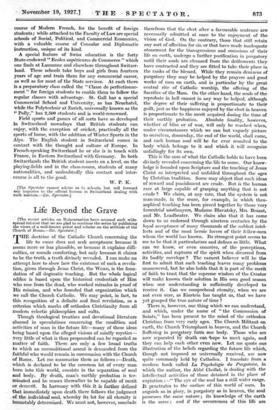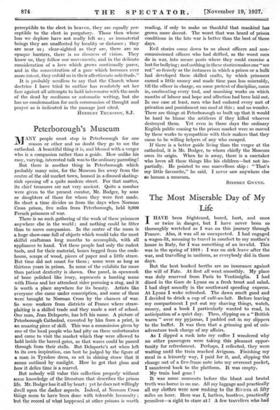Life Beyond the Grave
[The recent articles on Reincarnation have aroused such wide- spread interest that we are glad to continue the series by publishing the views of a well-known priest and scholar on the attitude of the Church of Rome, En. Spectator.] Though theological treatises and devotional literature abound in speculations concerning the condition and activities of man in the future life—many of these ideas being- based upon the alleged visions of saintly mystics— very little of what is thus propounded can be regarded as matter of faith. There are only a few broad truths to .which an unconditional assent is demanded-from the faithful who would remain in communion with the Church of Rome. Let me summarize them as follows ;—Death, which is declared to be the common lot of every man born into this world, consists in the separation of soul And body. By death, man's earthly probation is ter- rninated and he ceases thereafter to be capable of merit or demerit, In harmony with this it is further defined that immediately upon death there follows the judgment of the individual soul, whereby its lot for all eternity is immutably determined. We must not, however, conclude therefrom that the elect after a favourable sentence are necessarily admitted at once to the enjoyment of the vision of God. On the contrary, those that still retain any sort of affection for sin or that have made inadequate atonement for the transgressions and omissions of their life on earth, undergo a further purification in purgatory until their souls are cleansed from the defilements they have contracted and they are fitted to take their place in the ranks of the blessed. While they remain denizens of purgatory they may be helped by the prayers and good works of men on earth, and in particular by the great central rite of Catholic worship, the offering of the Sacrifice of the Mass. On the other hand, the souls of the reprobate in hell cannot in any way be helped, although the degree of their suffering is proportionate to their guilt, just as the happiness enjoyed by the elect in heaven is proportionate to the merit acquired during the time of their earthly probation. Absolute finality, however, whether of bliss or of woe, will only be reached when, under circumstances which we can but vaguely picture to ourselves, doomsday, the end of the world, shall come, and each human soul will be for ever reunited to the body which belongs to it and which it will recognize unfailingly for its own.
This. is the sum of what the Catholic holds to have been divinely revealed concerning the life to come. Our know- ledge is founded upon Scripture and the teaching of Jesus Christ as interpreted and unfolded throughout the ages by Christian tradition. Some may object that such ideas of reward and punishment are crude. But is the human race at large capable of grasping anything that is not crude ? We claim, at any rate, that the system is not man-made, in the sense, for example, in which theo- sophical teaching has been pieced together by those very terrestrial -sdothsayers, Madame Blavatsky, Mrs. Besant, and Mr. Leadbeater. We claim also that it has come down to us endorsed through nineteen centuries by the loyal acceptance- of many thousands of the noblest intel- lects and of the most heroic lovers of their fellow-men whom the world has known. Its strongest point seems to me to be that it particularizes and defines solittle. What can we know, or even conceive, of the perceptions, activities, and raptures of the spirit when divorced from its bodily. envelope ? The earnest believer will be the first to admit that such teaching leaves many pfohlems unanswered, but he also holds that it is part of the merit of faith to trust that the supreme wisdom of the Creator will make known their solution in His own good season when our understanding is . sufficiently developed to receive it. Can we comprehend eternity, when we are not even sure, as Einstein has taught us, that we have yet grasped the true nature of time ?
There is, however, one thing which we can understand, and which, under the name of " the Conimunion of Saints," has been present to the mind of the orthodox Christian from very early ages. The Church Militant on earth, the Church Triumphant in heaven, and the Church Suffering in purgatory form one body. Those who are now separated by death can 'hope to meet again, and they can help each other .even now. Let me quote one illustration of the beliefs regarding the future life which, though not imposed or universally received, are now quite commonly held by Catholics. I translate from a modern book called La Psychologie du Purgatoire, in which the author, the Abbe Chollat, is dealing with the intellectual activities of those detained in the place of expiation :—" The eye of the soul has a still wider range. It penetrates to the surface of this world of ours. In anguish as in glory, in purgatory as in heaven, the soul possesses the same nature ; its knowledge of the earth is the same : and if the occurrences of this life are perceptible to the elect in heaven, they are equally per- ceptible to the elect in purgatory. Those then whose loss we deplore have not really left us ; as immaterial beings they are unaffected by locality or 'distance ; they are near us ; clear-sighted as they are, there are no opaque barriers, there is no dimness of vision. They know us, they follow our movements, and in the delicate consideration of a love which grows continually purer, and in the concentration of a gaze which becomes ever more intent, they enfold us in their affectionate solicitude."
It is probably needless to say that the Church whose doctrine I have tried to outline has resolutely set her face against all attempts to hold intercourse with the souls of the dead by mediums or automatic writing, but she has no condemnation for such communion of thought and prayer as is indicated in the passage just cited.
HERBERT THURSTON, S.J.















































 Previous page
Previous page